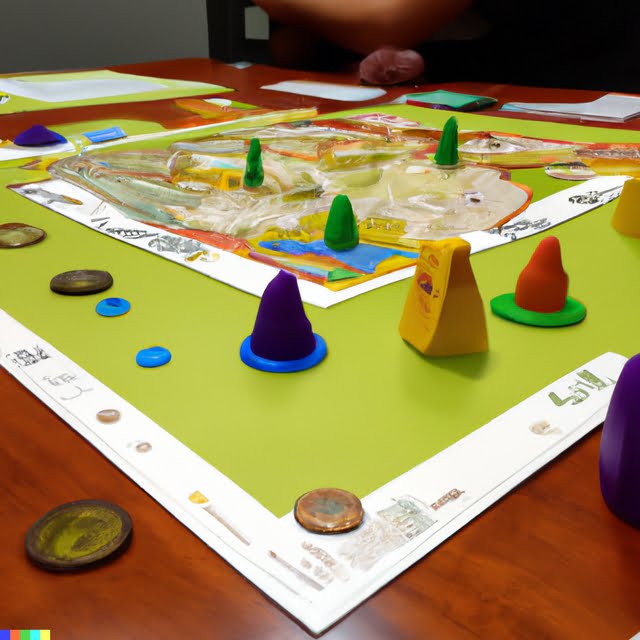Board games have long been used as a source of entertainment and social interaction, but they also lend themselves perfectly to the realm of education. In particular, board games have proven to be an effective tool for teaching war strategies. Whether you’re a history enthusiast, a fan of fantasy or science fiction, or simply someone who enjoys strategic thinking, there is a board game that can engage you in the art of war.
The benefits of using board games to learn about war strategies are numerous. Firstly, these games provide a hands-on learning experience that allows players to actively engage with and apply different strategic concepts. Rather than simply reading about war strategies in a book or watching them play out on a screen, players have the opportunity to make decisions, analyze outcomes, and adapt their tactics in real-time.
Furthermore, board games offer a unique avenue for exploration into historical wars and battles. Many popular historical board games focus specifically on war strategies and provide insights into past conflicts. Through these games, players can gain a deeper understanding of military tactics employed by various civilizations throughout history. Games like Axis & Allies, Risk, and Memoir ’44 are excellent examples of how board games can bring historical campaigns to life and immerse players in strategic decision-making.
Whether you’re interested in historical accuracy or prefer the realms of fantasy and science fiction, there is truly something for everyone when it comes to board games that teach war strategies. From exploring alternate worlds in Game of Thrones: The Board Game and Twilight Imperium to commanding the forces of the Rebel Alliance or Galactic Empire in Star Wars: Rebellion, these immersive gaming experiences provide fresh perspectives on war strategies while still honing critical thinking skills.
Historical Board Games
For war strategy enthusiasts and history buffs alike, historical board games offer a captivating and immersive way to learn about past wars and battles. These games provide a unique opportunity to step into the shoes of military commanders and make strategic decisions that can change the course of history. With their attention to detail, historical accuracy, and complex gameplay mechanics, these classics have become beloved staples in the world of board gaming.
One popular historical board game that allows players to recreate key conflicts of World War II is Axis & Allies. In this game, players take on the roles of major powers such as the United States, Germany, or Japan, commanding military units and making strategic choices to gain control over territories and resources.
Axis & Allies not only teaches players about the importance of resource management and diplomatic negotiations but also provides insights into the challenges faced by different nations during the war.
Risk is another classic historical board game that has stood the test of time. It takes players on a journey through global conquest as they deploy their armies and attempt to dominate the world map. By strategically placing troops, forming alliances, and planning attacks, players learn essential war strategies such as fortification, troop maneuvers, and risk assessment. Risk also exposes players to geographical knowledge by incorporating real-world maps into its gameplay.
Memoir ’44 offers a more focused experience on specific battles from World War II. This game uses a modular hex-based board to simulate famous engagements like D-Day or Operation Market Garden.
With its emphasis on tactics, unit positioning, and card management, Memoir ’44 presents players with realistic challenges faced by military commanders during these historic events. By playing this game, enthusiasts can gain a deeper understanding of the strategies employed by different sides in pivotal World War II battles.
Fantasy/Sci-Fi Board Games
When it comes to teaching war strategies, board games set in fantasy or science fiction worlds offer a unique and exciting approach. These games not only provide players with the opportunity to immerse themselves in fantastical or futuristic settings but also teach valuable war tactics along the way. By combining elements of strategy, diplomacy, and resource management, these fantasy/sci-fi board games offer a fresh perspective on war strategies.
Introduction to Fantasy/Sci-Fi Board Games
Fantasy and science fiction board games transport players into imaginative worlds where they can command armies, lead civilizations, or engage in intergalactic conflicts. While these settings may seem far removed from reality, the concepts of strategy remain at the core of these games. Players must still think critically about their moves and make decisions that will ultimately determine victory or defeat.
Benefits of Fantasy/Sci-Fi Board Games
One of the key benefits of playing fantasy/sci-fi board games for war strategy learning is that they allow players to think outside the box. By breaking away from historical contexts, players have more creative freedom in their decision-making and can explore alternative strategies that they might not have considered before. Additionally, these games often incorporate unique mechanics and gameplay elements that encourage players to adapt and develop new tactics as the game progresses.
Another advantage is that fantasy/sci-fi board games offer a sense of escapism while still teaching important war strategies. The immersive storytelling and visually captivating components bring an element of excitement to the learning experience. Players become emotionally invested in their chosen factions or characters, making every decision feel significant. This emotional attachment can further deepen understanding and engagement with strategic concepts.
Notable Examples
There are several notable fantasy/sci-fi board games that excel in teaching war strategies while providing an enjoyable gameplay experience. “Game of Thrones: The Board Game” is a popular example that challenges players to vie for control of Westeros through strategic military maneuvers, diplomacy, and cunning. “Twilight Imperium” takes players on an epic journey across the galaxy as they engage in political alliances, military conflicts, and cosmic conquest.
In “Star Wars: Rebellion,” players can either command the forces of the Rebel Alliance or control the Galactic Empire in a high-stakes battle for control of the galaxy. By simulating famous battles from the Star Wars universe, this game allows players to explore different war strategies while featuring beloved characters and locations from the franchise.
Overall, fantasy/sci-fi board games provide a unique and captivating approach to teaching war strategies. They offer an immersive experience where players can learn and apply essential tactics in exciting imaginary settings. Whether commanding armies, exploring outer space, or battling mythical creatures, these games combine entertainment with strategic thinking, making them a valuable tool for learning war strategies.
Cooperative Board Games
While competitive board games can be intense and exciting, cooperative board games offer a unique twist in teaching war strategies. These games simulate the need for alliances and joint planning, emphasizing the importance of teamwork and collaboration in war scenarios. In this section, we will explore some of the most popular cooperative board games that promote these skills.
Pandemic: Legacy
One highly acclaimed cooperative board game is Pandemic: Legacy. In this game, players work together as a team of specialists to contain and cure deadly diseases threatening humanity. Each player takes on a specific role with unique abilities, making strategic decisions critical to preventing outbreaks and finding cures. Pandemic: Legacy stands out for its innovative legacy format, where decisions made in earlier sessions can impact future gameplay, creating an immersive narrative experience.
Battlestar Galactica: The Board Game
Inspired by the hit television series, Battlestar Galactica: The Board Game combines cooperation with hidden objectives and treachery. Players assume different characters onboard the last remaining human spaceship, working collectively to survive against relentless Cylons. However, some players may secretly be Cylon infiltrators trying to sabotage humanity’s chances of survival. Balancing trust and suspicion adds an extra layer of depth to the strategic decision-making process.
Ghost Stories
Ghost Stories is a challenging cooperative game set in a fictional Chinese village haunted by ghosts and evil spirits. Players take on the roles of Taoist monks aiming to protect their village from supernatural threats. This game requires careful planning, resource management, and coordination between players to successfully exorcise ghostly entities before they overrun the village. Ghost Stories provides an intense and thrilling cooperative experience.
Participating in these cooperative board games not only develops teamwork and collaboration skills but also encourages strategic thinking and decision-making under pressure. By working together towards a common goal, players learn to communicate effectively, delegate tasks efficiently, and adapt their plans based on the evolving game state. These skills are vital in real-world war scenarios where coordinated efforts are often crucial to success.
Cooperative board games provide a cooperative and engaging way to learn about war strategies while fostering social interaction and teamwork. Regardless of whether players win or lose, the shared experience of overcoming challenges and strategizing together can be incredibly rewarding.
Abstract Strategy Games
Abstract strategy games serve as a unique category of board games that distill war strategies into simple mechanics. These games emphasize critical thinking, planning, and strategic decision-making, making them excellent tools for teaching war tactics in a simplified and accessible format. Unlike historical or fantasy-themed board games, abstract strategy games do not incorporate specific themes or narratives. Instead, they focus solely on the strategic elements of warfare.
One notable example of an abstract strategy game is Chess. Dating back centuries, Chess has stood the test of time as a classic game that challenges players to outmaneuver their opponents on the chessboard.
The game requires players to think several moves ahead, analyze different possibilities, and anticipate their opponent’s moves. Stratego is another popular abstract strategy game that simulates a battlefield where players hide their pieces with varying abilities and try to uncover and capture their opponent’s flag.
Another noteworthy abstract strategy game is Hive. In this two-player game, players take turns placing hexagon-shaped tiles with different insect symbols on them. The goal is to surround the opponent’s Queen Bee while protecting one’s own Queen Bee from being surrounded. Hive introduces concepts like defensive positioning, spatial awareness, and strategic maneuvering.
These types of abstract strategy games are particularly beneficial for teaching war tactics because they simplify complex strategies into manageable gameplay mechanics. By focusing purely on the strategic aspects of warfare without the distractions of theme or narrative elements, players can delve deeply into core concepts such as positioning, resource management, and anticipating opponents’ moves.
War Games for Kids
Board games offer a unique opportunity to teach strategy concepts to children at an early age. By engaging in war-themed games, kids can learn valuable skills such as critical thinking, decision-making, and planning. War games designed specifically for children provide a fun and interactive learning experience that helps develop their strategic mindset.
One example of a war game tailored for kids is Battle Sheep. In this game, players take on the role of sheep herders and strategically move their sheep around the board to occupy as much pasture as possible. This game introduces fundamental concepts such as spatial awareness and planning ahead. As children navigate the tactical decisions involved in outmaneuvering their opponents, they are unknowingly building essential problem-solving skills.
Castle Panic is another great option for teaching strategy concepts to kids. In this cooperative game, players work together to defend their castle from monsters by coordinating their actions and making strategic choices. By requiring teamwork and collaboration, Castle Panic promotes communication skills while exposing children to the importance of making calculated decisions under pressure.
Lastly, Risk Junior provides a simplified version of the classic game Risk specifically designed for younger players. It offers age-appropriate content while still introducing basic war strategy elements like territory control and resource management. By guiding them through the gameplay mechanics step by step, Risk Junior allows children to grasp these concepts gradually.
By incorporating war-themed board games into their playtime or educational activities, parents and teachers can foster important skills in children from an early age. These skills extend beyond gaming scenarios and can be applied to real-life situations that require strategic thinking and decision-making.
Education and War Strategy
In recent years, board games have gained recognition as valuable educational tools for teaching various subjects, including war strategies. Their interactive nature and hands-on approach make them particularly effective in engaging students and facilitating deep learning experiences. This section explores how board games can be effectively utilized in the classroom to teach war strategies.
One of the primary benefits of using board games in the classroom is that they provide a dynamic and immersive learning experience. Unlike traditional lectures or textbooks, board games allow students to actively participate and apply strategic thinking to real-world scenarios.
They enable students to analyze different options, make critical decisions under pressure, navigate complex situations, and learn from their outcomes. By simulating war scenarios through gameplay, board games create a safe space for students to experiment with strategic decision-making while promoting teamwork, critical thinking, problem-solving, and communication skills.
To incorporate board games into war strategy lessons, teachers can consider the following approaches:
- Game-Based Learning: Integrate specific board games into lesson plans to reinforce concepts covered in class. For example, after teaching about historical military tactics used during World War II, teachers can organize a game session of Axis & Allies where students apply these tactics to win the war.
- Design Thinking Activities: Encourage students to design their own board game based on specific historical wars or fictional conflicts from literature or movies. This activity prompts students to deepen their understanding of war strategies by researching and applying their knowledge creatively.
- Debates and Discussions: Use board game mechanics as a starting point for discussions on military strategies or ethical considerations in warfare. After playing Twilight Imperium, for instance, teachers can facilitate group debates on which actions were morally justified or explore alternative diplomatic solutions.
By integrating board games into the classroom, teachers can create an engaging and interactive learning environment that captivates students’ interest while cultivating essential skills and knowledge about war strategies. Board games offer a multidimensional approach to learning, combining historical facts, critical thinking, social dynamics, and strategic planning. Their ability to seamlessly blend entertainment and education makes them a valuable and enjoyable resource for educators in teaching war strategy concepts.
Online Resources and Communities for Board Games to Teach War Strategies
As the popularity of board games continues to rise, so does the presence of online resources and communities dedicated to these games. This is especially true for board games that focus on teaching war strategies. Whether you are a beginner looking for guidance or an experienced player seeking new challenges, there are numerous online platforms that cater to your interests.
One such platform is BoardGameGeek (BGG). BGG is a comprehensive online database of board games, where users can find information about different war strategy games, read reviews from other players, and engage in discussions on forums. The website also provides resources like rulebooks, tutorials, and strategy guides that can greatly enhance the learning experience. With its vast collection of user-generated content and active community, BGG is a go-to resource for any board game enthusiast.
Reddit’s r/boardgames is another valuable online community for those interested in board games focused on war strategies. This subreddit allows users to share their experiences, ask questions, and engage in discussions specifically related to war strategy board games. With over a million members, this community offers a diverse range of perspectives and insights into various games. It’s an excellent place to connect with other enthusiasts, discover new game recommendations, and learn from experienced players.
| Online Resource | Description |
|---|---|
| BoardGameGeek | A comprehensive database of board games with information, reviews, rulebooks, tutorials, and forums. |
| Reddit’s r/boardgames | An active subreddit community dedicated to discussing all aspects of board gaming. |
These online resources not only provide valuable information but also foster a sense of community and collaboration among players. From sharing strategies to organizing virtual gaming sessions, these platforms offer a space for players to connect with like-minded individuals and deepen their knowledge and skills in war strategy board games.
It is important to note that while online resources can significantly enhance the learning experience, they should be used as supplemental tools alongside physical board games. The tactile nature of board games provides a unique and immersive experience that cannot be fully replicated online. Therefore, it is recommended to combine the use of online resources with actual gameplay to achieve the most comprehensive understanding of war strategies.
Conclusion
In conclusion, board games are a fantastic tool for teaching war strategies due to their numerous benefits. Throughout this article, we have explored various categories of board games that offer unique perspectives on war tactics. Historical board games allow players to delve into the intricacies of historical conflicts, while fantasy and sci-fi games offer a fresh approach to strategy with captivating narratives.
Cooperative board games emphasize teamwork and alliance-building, while abstract strategy games promote critical thinking and planning skills. There are also age-appropriate options for children to begin learning about war strategies from an early age.
One of the key advantages of using board games for war strategy learning is the hands-on experience they provide. By actively participating in these games, players can engage with the material in a way that feels immersive and exciting. This interactive element helps reinforce strategic thinking skills while making the learning process enjoyable.
Incorporating board games into educational settings is another avenue where their potential shines. Teachers can utilize these games as part of history or military-themed lessons, enhancing students’ understanding and retention of complex concepts. Furthermore, online resources and communities dedicated to war strategy board games offer additional support by providing access to a broader community of enthusiasts and opportunities for discussion and analysis.
Frequently Asked Questions
What is the board game with soldiers strategy?
The board game with soldiers strategy refers to a type of board game that focuses on strategic planning and decision-making involving soldiers or military units. These games typically involve players strategically moving and positioning their soldiers on a board, aiming to outmaneuver their opponents and achieve certain objectives.
Such games often require players to consider factors such as terrain, unit strengths and weaknesses, resource management, and tactical maneuvers. Examples of board games with soldiers strategy include Risk, Axis & Allies, and Memoir ’44.
What board game simulates war?
A board game that simulates war is a game specifically designed to replicate the experience of armed conflict in a strategic manner. These games attempt to recreate the complexities and challenges faced by military commanders during war. They typically involve elements like maneuvering troops, conducting battles, capturing territories or objectives, managing resources or logistics, and planning strategies over different time periods or campaigns.
War-themed board games often aim for historical accuracy or incorporate fictional scenarios inspired by real-world conflicts. Some popular examples of war simulation board games are Twilight Struggle (focused on the Cold War), Command & Colors series (featuring various historical eras), and Advanced Squad Leader (depicting World War II combat).
What is the board game about war?
A board game about war encompasses any game that revolves around warfare as its main theme or subject matter. These games can vary widely in terms of gameplay mechanics, complexity, scale, time period depicted, level of abstraction, and intended audience. While some war-themed board games may focus primarily on strategic confrontation between armies or factions (such as historical wargames), others might explore different aspects of warfare like command decisions, logistics management, political maneuvering, or even the human experience and moral dilemmas during war.
Examples of well-known board games about war include Diplomacy (emphasizing negotiation and diplomacy in a pre-World War I setting), Memoir ’44 (recreating specific battles from World War II), and War of the Ring (adapted from J.R.R. Tolkien’s Middle-earth fantasy setting).

I love playing all kinds of games – from classics like Monopoly to modern favourites like Ticket to Ride.
I created this blog as a way to share my love of board games with others, and provide information on the latest releases and news in the industry.





